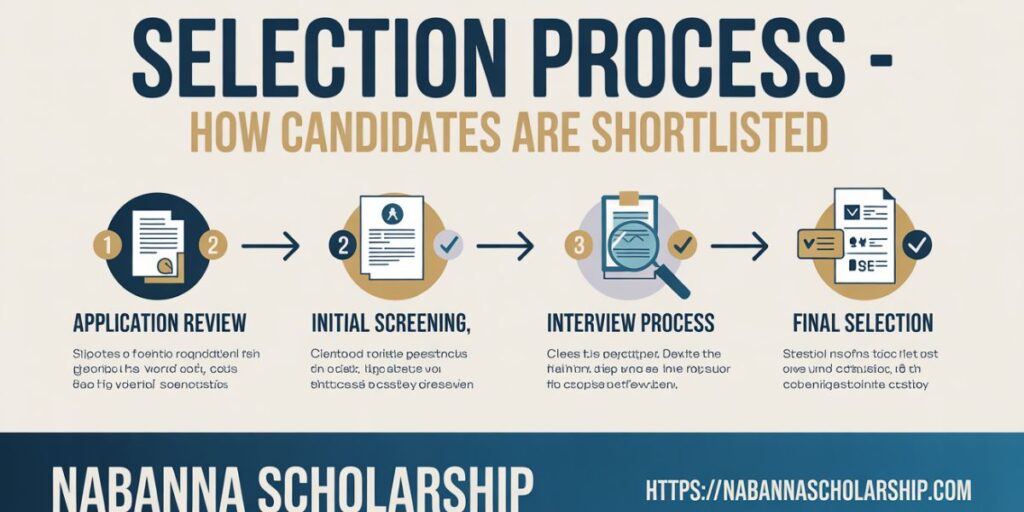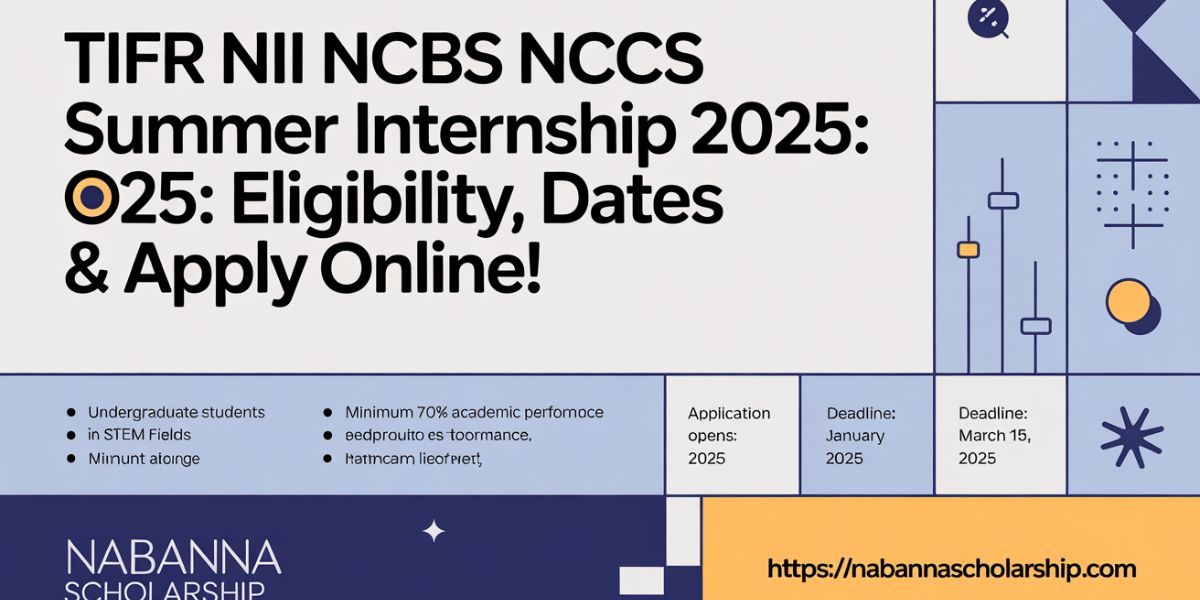The TIFR, NII, NCBS & NCCS Summer Internship 2025 programs offer a rare chance for biotech and life science students to gain hands-on research training in India’s top laboratories.
These internships provide real exposure to molecular biology, cell culture, genomics, and advanced laboratory techniques under expert mentorship. They are ideal for students aiming for PhD programs, research fellowships, or a scientific career.
Why These Top Indian Research Internships Matter in 2025?
Research builds real knowledge beyond books. These summer research internships in India give students hands-on lab experience in biotechnology, molecular biology, and life sciences. They help students grow with real experiments and scientific learning.
These programs support careers in research, PhD study, and fellowships. B.Sc., M.Sc., and B.Tech life science students should apply if they want strong research skills and future academic success.
Participating Institutes and Internship Details
The Summer Research Programs are offered by four top institutes in India that focus on advanced biological sciences and research training. Each institute has its own internship structure, eligibility rules, and research facilities for students.
Tata Institute of Fundamental Research (TIFR), Mumbai
TIFR offers research training in molecular biology, biophysics, genetics, and computational biology through its VSRP program. Around 150–200 seats are available each year, but selection stays highly competitive. Only students with strong academic records and a clear research interest qualify, and a well-written SOP increases the chance of selection.
National Institute of Immunology (NII), New Delhi
NII focuses on immunology, infectious diseases, cell biology, and vaccine research. Students work with senior scientists and expert mentors who guide them in real lab experiments and research techniques. The program builds strong foundations in experimental biology and offers exposure to high-level research labs in India.
National Centre for Biological Sciences (NCBS), Bangalore
The NCBS internship follows a structured research program where students work on independent mini-projects under expert supervision. Training takes place in advanced research labs focused on neuroscience, genetics, cell biology, ecology, and computational biology. Students gain practical experience in laboratory design, data analysis, and scientific reporting, which builds confidence for future PhD and research careers.
National Centre for Cell Science (NCCS), Pune
The NCCS summer training includes modules in cell biology, molecular cloning, cell culture techniques, and microbial genetics. Students work inside fully equipped research labs and handle real experiments guided by scientists. The internship runs for 6–8 weeks at the NCCS campus in Pune, offering a focused and practical research learning experience.
Eligibility Criteria (Who Can Apply?)

These summer internships are designed for dedicated science students. The rules are simple and clear for all applicants. Below is a complete explanation of each requirement.
Educational Qualifications
Students from recognized universities or colleges can apply. The following categories are accepted:
- B.Sc. students (2nd or 3rd year)
- B.Tech./B.E. students (3rd or 4th year)
- M.Sc. students (1st year preferred)
- Integrated M.Sc. students (2nd to 4th year)
- M.Tech. students
- Pharmacy, Agriculture, and Veterinary science students in relevant fields
Minimum Academic Performance
A good academic record is expected. Most institutes require:
- Minimum 60% marks or CGPA 7.0 and above
- Consistent performance in previous semesters
- No backlogs during application
Age Limit (If Any)
Most institutes do not specify any age limit. These programs aim to encourage learning and research training. Only academic level and subject eligibility are checked.
Eligible Study Streams
Students from science backgrounds linked to research and life sciences are accepted. Common eligible streams include:
- Biology
- Biotechnology
- Life Sciences
- Microbiology
- Biochemistry
- Genetics
- Cell Biology
- Molecular Biology
- Biomedical Sciences
- Bioinformatics
- Zoology / Botany
Students from Chemistry or Physics may also apply if research aligns with interdisciplinary projects.
Internship Benefits & Learning Outcomes
These internships help students build real research skills and improve their academic career. The programs also provide learning exposure in top Indian research labs.
- Hands-on research training with real experiments
- Practical lab skills under expert supervision
- Certificate after internship completion
- Recommendation letter from research mentor
- Use of advanced research labs and tools
- Exposure to modern scientific techniques
- Guidance for higher studies like MSc and PhD
- Research project experience for profile building
- Chance to publish research papers (in some cases)
- Strong resume/CV improvement
- Networking with scientists and scholars
- Better career opportunities in research and biotech fields
Stipend & Accommodation Details
Financial support for these internships is limited because the main goal is research training and skill development. Still, some institutes offer basic facilities like hostel or travel support based on availability.
| Institute | Stipend Provided | Accommodation/Hostel | Travel Support | Other Benefits |
| TIFR, Mumbai | No monthly stipend | Limited hostel rooms for selected students | Not provided | Library + lab access |
| NII, New Delhi | Not paid | May provide hostel if available | Not available | Mentorship + seminars |
| NCBS, Bangalore | Usually unpaid | Hostel may be provided | No travel support | Campus facilities |
| NCCS, Pune | Unpaid internship | Hostel on request (limited seats) | Not available | Research training support |
| External Fellowships (INSPIRE/CSIR/DBT) | Yes (if selected separately) | Depends on host institute | Case-specific | Financial assistance available |
Application Process – Step by Step Guide
Applying for these biotechnology and life science internships is simple but must be done carefully. Every student must follow the instructions given by each institute to avoid rejection.
Online Registration Process
First, the student must create an account on the official website of the selected institute (TIFR, NII, NCBS, NCCS). A valid email ID and mobile number must be used because all updates are shared online. Registration must be done before the deadline, or the application will not be accepted.
Application Form Filling Guide
Next, the student must fill in correct personal details, academic records, and college information. The resume, statement of purpose (SOP), and academic transcripts must be uploaded. Fake or incomplete details must not be given because verification is done later.
Project Preference Selection
After that, applicants must select research projects related to fields like molecular biology, genetics, bioinformatics, microbiology, and cell biology. Most institutes allow students to choose a preferred lab or research guide. The selected topic must match the student’s background to increase selection chances.
Submission Confirmation
Finally, students must review the application and click on the submit button. A confirmation page or email is received after successful submission. The application ID must be saved for future tracking. Some institutes also require teachers to send recommendation letters separately.
Required Documents
Before applying, students must prepare a few essential documents. These help institutes verify your eligibility and interest in life sciences research. Make sure all papers are clear and updated before uploading.
- Academic Certificates: Include recent marksheets or transcripts from your current course.
- Bonafide Letter: Get this from your college or university, confirming you are an enrolled student.
- Research Statement / SOP: Write a short note (300–500 words) describing your research interest, goals, and why you want to join the internship.
- CV / Resume: Highlight your academic background, technical skills, and any small research or project experience.
- Identity Proofs: Provide a valid student ID card, Aadhaar card, or passport copy for verification.
Each institute may ask for one recommendation letter too, so check their guidelines before submitting.
Selection Process – How Candidates Are Shortlisted

The selection process for these summer research internships is strict because many students apply from across India. First, applications are screened based on academic scores and eligibility to check whether the student fits the life science or biotechnology research background. After that, the Statement of Purpose (SOP) is studied carefully to judge the student’s research interest and motivation.
Candidates with clear goals, relevant skills, and strong academic records are added to the merit-based list. Some institutes may also conduct a short interview or email discussion with shortlisted students before giving the final offer letter. Only sincere and dedicated applicants move to the final selection stage
Important Dates (Expected Schedule 2025)
The application timeline for TIFR, NII, NCBS, and NCCS Summer Internship 2025 usually begins early in the year. Students must apply before the deadline because late applications are not accepted. Below is the tentative schedule based on previous years:
| Institute | Application Start | Last Date to Apply | Interview/Shortlisting | Result Announcement | Internship Period |
| TIFR (Mumbai) | January 2025 | February 2025 | March 2025 | March 2025 | May – July 2025 |
| NII (New Delhi) | February 2025 | March 2025 | April 2025 (if applicable) | April 2025 | May – June 2025 |
| NCBS (Bangalore) | February 2025 | March 2025 | April 2025 | April 2025 | May – July 2025 |
| NCCS (Pune) | February 2025 | March 2025 | April 2025 | April 2025 | May – June 2025 |
Tips to Increase Selection Chance
A strong application plays a big role in getting shortlisted for these competitive research internships. These programs select only a few students from thousands of applicants. So you must present your academic and research potential clearly and professionally.
- Build a strong resume: Highlight lab skills, mini-projects, certifications, and research exposure. Keep your CV clean and professional.
- Improve academic performance: Many institutes follow merit-based screening, so a good CGPA increases your chances.
- Write a focused research interest statement: Your SOP should explain why you want to join research, which field you like, and what problem excites you. Avoid general or copied statements.
- Take faculty guidance: Request a professor or mentor to review your application. Their feedback will make your resume and SOP more powerful.
- Show skill development: Adding basic lab skills, bioinformatics tools, or online research courses from platforms like Coursera or NPTEL makes your profile stronger.
- Stay professional: Use a formal email ID, correct grammar, and submit documents properly in the required format.
Career Growth After Internship
A summer internship at TIFR, NII, NCBS, or NCCS opens powerful career doors in the field of life sciences and biotechnology research. These programs build a strong academic foundation and boost your research profile for higher studies and jobs.
- PhD opportunities: Many students receive direct interview calls or research assistant offers from top labs after completing the internship. These internships improve your chances of getting selected for PhD programs in India and abroad at institutes like IITs, IISc, IISERs, EMBL, MIT, Oxford, and Max Planck Institutes.
- DRDO/CSIR/ICMR fellowships advantage: A strong research profile increases your success rate in competitive fellowships such as CSIR-NET JRF, DBT-BET, ICMR-JRF, GATE, and DRDO RA programs. Internship experience gives you better research understanding and boosts interview performance.
- Future career relevance: This internship adds high value to your CV and LinkedIn profile. It shows commitment to scientific research, which helps in securing roles in R&D companies, biotechnology labs, research universities, pharma industries, and government projects.
How to Contact Institutes?
If you need help during the application process or have questions about eligibility, stipend, or documents, you can contact each institute using their official communication channels. Always use polite and professional language while sending emails.
| Institute | Official Website | Application Portal | Contact / Helpdesk Email |
| TIFR (Mumbai) | https://www.tifr.res.in | VSRP Program Page | info@tifr.res.in |
| NII (New Delhi) | https://www.nii.res.in | Internship Section | academiccell@nii.ac.in |
| NCBS (Bangalore) | https://www.ncbs.res.in | Summer Internship Page | internship@ncbs.res.in |
| NCCS (Pune) | https://www.nccs.res.in | Training Program Link | academic@nccs.res.in |
Frequently Ask Questions?
Is this internship paid?
TIFR and NCBS offer stipends, while NII and NCCS are mostly unpaid. Benefits like hostel or travel support may vary by institute.
Can international students apply?
These internships are mainly for Indian students. Only TIFR may consider international applicants in limited cases.
How many students are selected?
Selection is very competitive and limited to about 20–80 students per institute each year. Seats depend on lab availability.
What CGPA is required?
A minimum CGPA of 7.0 or 70% is usually preferred. Higher academic performance improves your selection chance.
How to write a strong SOP?
Write a focused SOP that shows your research interest and future goals. Keep it original and avoid copied content.

